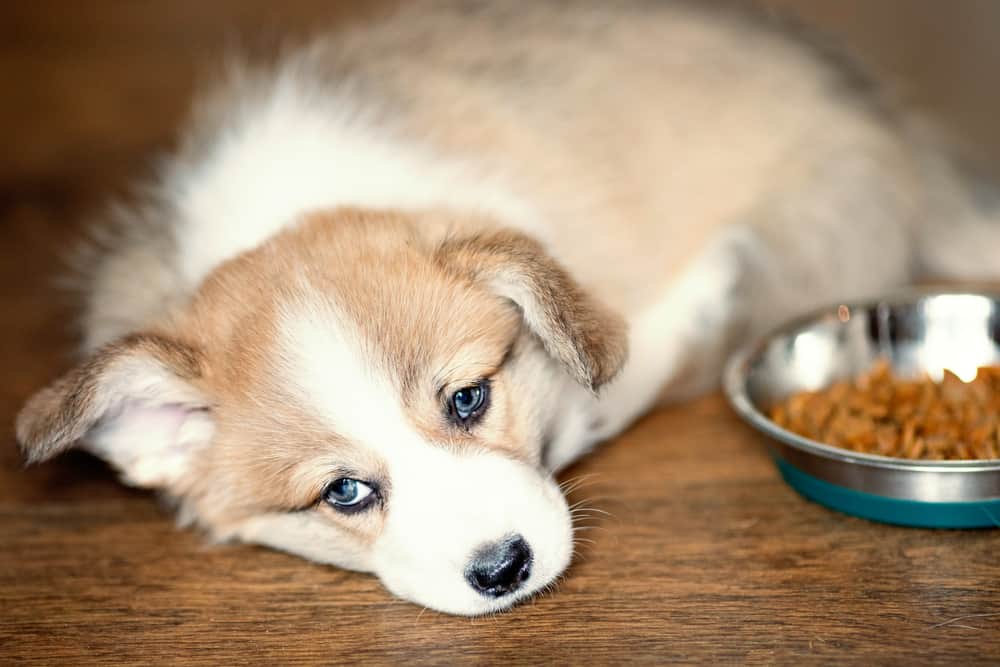
To put it simply, getting old sucks – even for dogs.
If your older dog has stopped eating, there are many reasons why this may be so.
To get to the heart of the matter, though, you need to try a bunch of different things to see what works.
For instance, one reason why your dog may not want to eat is that his senses of smell and taste are diminishing.
You can try spicing up his standard dog food, or you can opt to switch him to a different diet.
Either way, you should double-check with your vet before you change up his routine to make sure there isn’t something more serious going on.
Keep reading for a bunch of different suggestions you can try to encourage your old dog to eat again.
What to Feed an Older Dog
When it comes to nutrition, dogs are like people – every one of them is an individual with his or her own nutritional needs.
On that note, as your dog ages, you need to take into consideration the types and amounts of calories, fiber, minerals, and protein you’re feeding him.
Calories
Dogs are just like people in that they can’t – and shouldn’t – eat the same number of calories when they’re older as they did when they were younger.
While every dog is different, on average you should feed your dog about 20 percent less calories as a senior than he was eating when he was younger.
This is because as the body ages, it is less efficient at burning off calories and instead stores the extra calories as fat.
This is why both dogs and humans tend to put on a few pounds as we reach our golden years.
Protein
You may have heard that protein is bad for older dogs because it puts undue stress on their kidneys.
This is actually a myth. In fact, studies prove that older dogs actually need more protein than they did in their younger days.
Ask your vet about what kinds of protein – or foods containing protein – are safe to add or substitute into your dog’s daily diet.
Fiber
Fiber is a touchy subject because while it may be helpful for constipation and glucose levels, it can also become detrimental to an older dog’s diet.
Talk to your vet about what fiber you should feed your dog, and in what amounts.
Else, fiber can cause your older dog to lose weight – not something he necessarily needs – and it can interfere with him receiving proper nutrition from his food.
Minerals
Let’s talk about minerals for a second.
Perhaps the largest offender in this category is salt. An older dog could definitely do with less salt in his diet, so that goes without saying.
Unlike people, dogs do not need extra calcium to form strong bones. As long as they ate a good diet filled with calcium when they were younger, they don’t need extra calcium when they’re older.
If, however, you may have adopted a dog who came from not the best of conditions, you can talk to your vet about calcium supplements. More likely than not, though, your vet will probably advise against them.
Older Dogs and Drinking
It is important you keep on top of your older dog’s drinking habits as well.
Older dogs are more likely to suffer from dehydration.
This is either because they have health problems that affect urination, such as kidney disease, or because they are on medications for health issues that act as diuretics.
Always keep that water dish filled with cold, clean water.
You can even set up several dishes throughout the house for your older fella, especially if he has difficulty getting around. Plus, the ease of finding an available dish may encourage him to drink more.
Methods You Can Use to Encourage Your Older Dog to Eat

Here are some tricks you can try to make your dog’s dish sound a bit more appetizing.
Warm Up His Food
Don’t serve him the other half of yesterday’s wet food in a can straight from the fridge – yuck!
Would you want to eat cold leftovers? Maybe it never bothered him before, but in his older age, it may just bother him now.
Warm the food up for a few seconds in the microwave or allow it to reach room temperature before serving.
Mix His Wet and Dry Food Together
If your dog goes crazy over wet food but not so much over dry, try spreading a layer of wet food over his dry food at dinner time.
It will feel like a fancy feast to him and may encourage him to eat more of his dry food.
This is because dogs often prefer the feel and taste of wet food better than dry food. It’s a way of giving him a “treat” without switching over to something that is otherwise potentially unhealthy.
Switch Up His Food Occasionally
You have to be careful with an older dog that you don’t upset his belly doing this, but switch to a different flavor of food occasionally to spice things up.
This is especially helpful for dogs with a reduced sense of smell.
Mix the new food in gradually with his old food each day until he gets used to it.
Else, if you only feed your dog dry food, try feeding him wet food, and vice versa.
This may be just enough of a change-up to tickle his fancy and encourage him to eat again.
Praise Him When He Does Eat
Your dog is like your child – he lives to please you.
When you call him a “good boy!” for eating his food, he’ll want to do it more to make you happy.
And, of course, if he’s eating more than he was, you’ll be very happy indeed!
However, one thing you want to do here is reduce his treats. Some dogs get so used to treats that they don’t want to eat their normal food anymore.
If you tend to go heavy on the treats with your dog, now is the time to put him on a hard and fast diet!
Possible Reasons Why Your Older Dog Is Not Eating
There are several reasons why your older dog may not be eating.
Of course, we often worry that once our dog stops eating, this is basically a red flag that his end times are upon us.
This may not be the case, however, which is why it is important to talk to your vet immediately if your dog refuses to eat.
The quicker you can diagnose the problem, the quicker you can try out solutions to fix it.
However, here are some things to keep in mind insofar as why your dog isn’t eating that you may want to ask about at your vet visit.
Illness
No one wants to imagine that the reason why their dog is not eating is because he is sick, but if he’s not eating, he just might be.
Typically, the loss of appetite as a solo symptom is nothing to worry too much about and should correct itself once you realize the root cause.
However, if your dog’s lack of appetite also comes with vomiting, diarrhea, or lethargy, you should take your dog to the vet immediately.
A lack of appetite can mean anything from cancer to a liver or kidney issue, or he may not be eating because he is in pain somewhere.
Your vet will be able to figure it out and advise you accordingly.
Dental Issues
When we have a toothache, we have difficulty eating, switching to foods like applesauce and mashed potatoes, but dogs don’t have that luxury.
All they know is that eating hurts them, so if they don’t eat, they won’t hurt – problem solved!
Only, they don’t realize the havoc they are creating in their bodies, and that they still need their nutrients to remain healthy and survive.
Have your vet check inside your dog’s mouth for a broken tooth, gum disease, or even an oral tumor.
Chances are good that your vet is already looking for these things at the mention of your dog’s lack of appetite, but it’s still good to bring up nonetheless.
He’s Picky
That’s right – there’s a reason we call our dogs our kids. Sometimes they don’t want to eat because they are feeling picky, and that’s just not what they want to eat right now!
There are several things you can try here to get through to your dog, including making mealtime a game that’s more fun for him.
To do this, you can buy one of those food-dispensing toys that give out food when he completes the puzzle. Or you can reward him with his own food, rather than treats when he does well.
Stress
Have you recently had a stressful life event happen? Did you move, travel for a while, or have a baby?
If so, your dog may be exhibiting a lack of appetite as a side effect of stress.
If you traveled with your dog, he may have an upset stomach from all the traveling.
Or he may be feeling ill at ease or stressed out in his new environment.
Ask your vet for some suggestions on what you can do to ease his discomfort and encourage him to eat again. (You can also try some of the suggestions listed above!)

Calvin is the co-founder and one of the main contributors to dogtemperament.com. He has been an avid dog lover all his life. He enjoys researching and sharing great ideas on how you can avoid common pitfalls of dog ownership and build the most loving and enjoyable relationship with your dog.